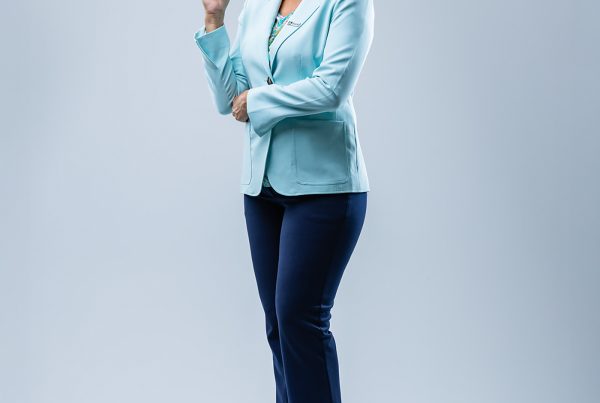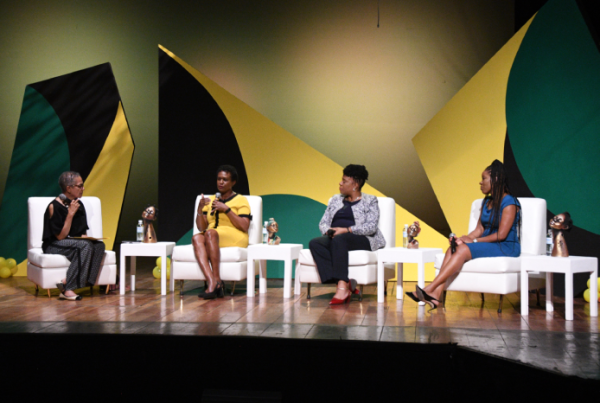The moment a student enters the classroom of Stacey Taylor, Maths teacher, at the Hatfield Primary School, in Manchester, they immediately know they are in for something new and different.
“If what they’re accustomed to is the regular ‘chalk and talk’ teaching method, they won’t find it here,” said the 18-year veteran. “My goal is to make the lesson as relatable and exciting as possible, while ensuring that students grasp the concepts. Therefore, I incorporate games, music and documentaries, to bring the lessons to life.”
That’s exactly what was witnessed on a visit to Hatfield recently, as on entering the Grade 6T classroom; one could hear the tune of Lady Gaga’s, “Poker face,” emanating from cell phone speakers.
On listening closer to the lyrics, however, it was quickly realised that the popular song had been remixed to include lyrics about Maths and Geometry.
“Gotta love, gotta love, gotta love Geometry. Points, rays and segments, planes and lines. G-G-geometry, g-geometry,” the students sang, while nodding their heads to the music.
Moments later, the students were engrossed in a competitive game of Bingo, which also had a mathematical twist.
Even the self-proclaimed hater of all things Mathematics, student Jesscelia Davidson, admits that Miss Taylor’s Maths classes were exciting.
“I don’t really like Maths. But, Miss Taylor really tries her best to make the subject fun, and even when I doubt myself, she encourages me. Before I came into grade six, I hated Maths and found it hard to understand the concepts. I still do not like maths; however, I understand it now,” Miss Davidson explained.
The 12-year-old further indicated that she will be working harder to grasp the subject, as her goal is to become a lawyer.
For Kareek Carter, Mathematics is his favourite subject, and naturally Miss Taylor’s class is his favourite place to be. “I like the fact that she uses games, especially computer games, to help us to understand and appreciate the subject. And, when you’re in her class you always learn something new,” he related.
If the words of her students are anything to go by, then it’s no surprise that Miss Taylor recently won the JN Bank sponsored National Mathematics Teacher of the Year competition.
Miss Taylor, an educator at Hatfield Primary for 17 years, has been teaching Maths at the grade six level for the past five years. She pointed out that, one of her first tasks when meeting a new class of students is to get to know each one, to be able to assess their strengths and weaknesses.
“On the first day of class, all my students are given an aptitude test. That way I immediately know the individual needs of each child. Then, I am able to tailor a lesson plan especially for that student,” she said, describing what educators’ term, “the differentiation method.”
“In my classroom, it is not one-size-fits-all,” she affirmed. “As a teacher, you need to take into consideration each student’s unique learning style. We have auditory learners, who learn by hearing; therefore, whichever lesson I’m teaching I will incorporate some amount of talking and singing. Then, we have visual learners; hence, I often include charts. And, for my kinesthetic learners, who love to move, I integrate games; and, sometimes even dancing, into the lessons.”
The Manchester native noted that her goal is to stimulate her students to think critically and make discoveries on their own, rather than absorb and regurgitate the information.
“At the end of the day, my hope is that my students will learn that mathematics is not only about numbers, calculations and algorithms, but that it’s also about thinking, reasoning and understanding,” she pointed out.
Miss Taylor’s efforts are slowly bearing fruit, as results from the 2018 sitting of the Grade Six Achievement Test (GSAT) revealed significant improvement in her students’ performance in Maths, when compared to previous years.
Of the 24 students who sat the GSAT this year, 21 received a passing grade in the subject, with the majority of students being placed in the schools they selected.
A breakdown of the grades revealed that three students scored above 90 percent, with one attaining a mark of 99 per cent; while 18 students scored 50 per cent and above. Only three students received grades below 50 per cent in the subject.
This is a dramatic improvement over the 2017 results, in which less than 50 per cent of the students scored 50 per cent and above in Maths.
Denise Kates, Acting Principal at Hatfield Primary, is quite pleased with the performance of students this year. And, she credits what was achieved to the efforts of Miss Taylor.
“She’s an ardent educator, who goes above and beyond the call of duty, to ensure that her students grasp the concepts. She’s a real asset to this school,” Mrs Kates noted.
Despite the success, however, Miss Taylor admitted that there is still much work to be done.
“I wish I had more time with them,” she said. “The one year I have to prepare them for the GSAT is really not enough. And, I am not trying to make excuses. It’s a really short period, to get students ready to sit an exam. However, looking at where they were when I got them, to where they reached when they leave, there was a lot of improvement,” Miss Taylor admitted.
She also noted that a part of the problem is that the students’ lack of access to relevant textbooks and computers.
“We have a computer lab; however, the computers are ancient. We are living in a technology-driven age; therefore, we need proper equipment, such as modern computers and Internet access, so that our students won’t be left behind.”
Miss Taylor is hoping that the Tablets in Schools project will help to address this problem; and noted that some parents, due to financial constraints, also have difficulties acquiring the necessary text books.
“I’m not sure if when the Tablets in Schools project arrive at Hatfield, we’ll be able to load the text books onto the computers. But, that is one way to level the playing field,” she said. “This would allow all the children to have the same, or equal opportunity, to acquire the necessary textbooks and information.”
Miss Taylor is optimistic that Hatfield Primary will continue to improve its student’s mathematics scores. She’s also hopeful that, overall, “We will continue to see improvements in the results from students who sit Mathematics in external examinations, at the primary and secondary levels.”
She recommended that additional resources and attention must be placed on the teaching of Maths at the primary level. “We need to fix things at the primary level, because that’s where the foundation is laid. We need more specialist teachers at that level. It is sad to say that we have many teachers who do not like Maths,” she noted.
She argued that unknowingly some teachers pass on their dislike for the subject to their students. “Therefore, what we need are more teachers who choose to teach Maths, who love Maths, and are passionate about the subject,” she maintained.
Miss Taylor suggested that the Government could offer more incentives, such as scholarships and grants, to encourage teachers to study Mathematics.
“We could have a system in which they are bonded for a few years, straight out of college; and, therefore, we could probably place more specialists math teachers in primary schools, from Grade One through to Grade Six,” she advocated.





